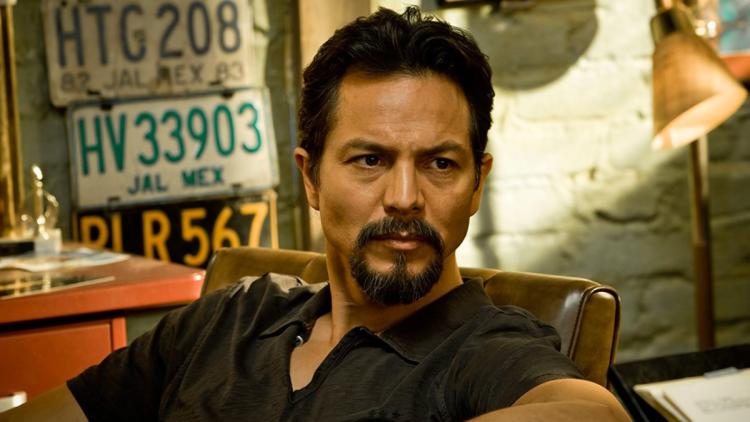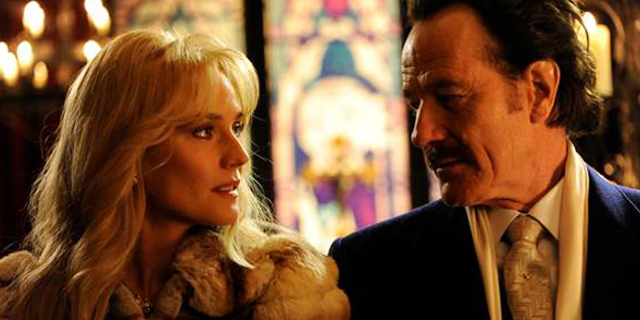Brad Furman does familiar stories well. When you watch a movie like The Lincoln Lawyer (which I will immediately pop on after I finish this review) or Runner, Runner (which I actually kinda liked, but once was enough), chances are you’re not watching to find out what happens next. You know the broad beats, or if you don’t, you can key into them pretty quickly as you watch. Here, we have the true story of Operation “C” Chase, engineered by Floridian undercover customs agent Robert Mazur (Bryan Cranston) in 1985. Drugs have been flowing through South Florida like water through a stream; the area has become a war zone, and the Feds don’t have any answers. Mazur has a thought: we already have a general idea of where the drugs are coming from, but what about the money? Mazur, whose extended family already has some real estate connections with questionable legality, goes undercover as wealthy businessman Bob Musella; with the help of fellow undercover agent Emir Abreyu (John Leguizamo), he approaches high-ranking members of the Medellin Cartel and offers to launder money for them.
The Infiltrator runs down the checklist of undercover crime thrillers: The job creates tension between Bob and his wife. Bob befriends the men he’s supposed to bust. Bob is constantly reminded of just what will happen to him and his family if his cover gets blown. (One of his informants, played by Preacher‘s Joseph Gilgun, drives it home in an epic monologue near the start of the third act that would feel over the top if I didn’t believe every last syllable out of his mouth. Gilgun doesn’t have a lot to do here, but he does it memorably.) You know how this plays out; moreso if you look up the autobiography the movie is based on.
Still, Brad Furman keeps his cool and delivers a movie that’s so entertaining, the only reason to talk about how familiar it feels is a sense of critical obligation. I have my issues with the movie: Some of the music cues, like “Pusherman” and “Eminence Front,” feel a little too obvious, and I think Furman and cinematographer Joshua Reis overdo it on the color filters a bit (more on this later). More substantially, Amy Ryan feels somewhat wasted as Mazur’s ball-busting boss, and there are parts where the line of logic the plot follows gets a little blurry; I’m not always a hundred percent on how A led to B or F led to G. These complaints feel niggling, though; stuff that keeps it just out of reach from the “instant guy movie classic” tier. It’ll have to settle for the “compelled to leave it on when you run across it on cable” tier.
It helps that the movie’s fronted by Bryan Cranston, who’s instantly compelling as Robert Mazur. He and John Leguizamo find a great rapport: Mazur as the cool, prepared outsider, Abreyu as the impulsive, fly-by-wire insider, each developing a respect for the way the other operates. After Mazur hastily makes up a story about a fiancée to get out of sex with a stripper, Abreyu gets gradually backgrounded and Mazur starts working with Kathy Ertz (Diane Kruger), a green agent who has never done undercover but is a surprising natural at it. Posing as Bob Musella’s fiancée, she and Mazur bond with top Pablo Escobar lieutenant Roberto Alcaino (Benjamin Bratt) and his family.
Spoilers Below
Bratt is fantastic here. The film doesn’t have too much pity for him, strongly implying he was responsible for an assassination that (in this film, at least) almost took out Mazur in the crossfire. But he finds enough genuine humanity in this monster that his bond with Mazur feels less like an expected trope of the genre and more like a natural byproduct of their interactions together. Mazur, an old hand at undercover work, doesn’t really have any reason to feel too awful about how he’s playing these people, but the film is able to leverage Ertz’s inexperience to acknowledge how messed up this is. Kruger (who admittedly struggles a bit with an American accent) plays it just well enough to keep it from overpowering the movie and dragging on the film, while still allowing Cranston to bounce off it and bring out Mazur’s sense of empathy, further strengthening his bond with Ertz. There’s some sexual tension between the two, but Furman, Cranston, and Kruger make it gracefully clear that it’s a byproduct of proximity, adrenaline, and mutual respect. Both characters seem strongly aware that it’s not real, and that gives the overall film another interesting edge to it.
Ellen Brown Furman’s script has a few grace notes like that, including a brief digression into the CIA’s interest in Mazur’s case (which goes nowhere in the actual narrative, but pays dividends in the epilogue) and the way Mazur almost seems to stumble into the Bank of Credit and Commerce International’s involvement with the cartels. They keep the narrative electrifying and, in some instances, turn the genre’s familiarity into a strength. Consider, as I mentioned earlier, the tension between the hero and his wife; again, practically de rigueur in this genre. Here, Mazur’s wife Ev (Juliet Aubrey, The White Queen) certainly has reservations about her husband’s continued undercover work. As written and acted, though, Ev is a far cry from the sobbing stereotype the genre usually offers up.
There’s a scene where Mazur, already deep into his Bob Musella character, takes his wife out to an impromptu dinner after forgetting their anniversary. He’s desperate for her forgiveness, she’s happy he’s making the effort but still obviously disappointed in him. So into this already uncomfortable domestic situation, here comes an armed cartel member who knows Mazur as Bob Musella. He makes himself comfortable, and Bob introduces his wife as his secretary, out celebrating her birthday—which Bob knows sounds thin the minute it leaves his mouth. That’s when a young waiter comes by with a big chocolate cake that says “Happy Anniversary,” and Bob is forced to throw this guy under the bus in the worst way possible, just to keep him and his wife alive. Later, in the car, Ev tells Bob that his treatment of the waiter was the most disgusting, degrading thing she’s ever seen, and she means it…yet, there’s just a hint of fascination, maybe even arousal on her face. Ev both loves and hates what this job is doing to her husband, and knowing that about her makes it so much easier to understand and sympathize with the choices she makes throughout the film.
With the ensemble in front of the camera kicking so much ass for him, Brad Furman’s job is that much easier. Again, I think the film is a touch overdirected, with an over-reliance on filters to convey setting and mood. That really only applies when the narrative takes the audience into New Jersey or Europe, though; when we’re in Florida, the filtered, blown-out cinematography combines with Crispian Sallis’s production design to make the setting feel like a unique, sweaty slice of hell. It captures the cracked-out desperation of the area perfectly, which suits a story where Mazur’s continued survival seems to hinge on the whims of dangerous men and dumb fucking luck. And even though Furman’s fingerprints are all over it, they’re never so distracting that they get in the way of the great performances.
For me, this is Furman’s MO: he makes small, familiar tough-guy movies that pack a surprising punch, somebody who would have flourished in the 80s and 90s alongside the likes of John Flynn (Rolling Thunder, Out For Justice). Such films have always lived or died on their scripts; as such, I’m not sure Furman is a filmmaker to be automatically excited for. After The Infiltrator, though, I’m not inclined to dismiss him out of hand, either.
The Infiltrator is now playing.




